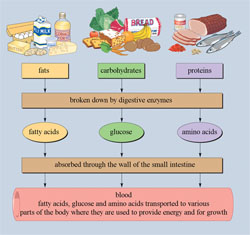2.3 Digestion of the main food groups
The glucose in the blood is one of the most important breakdown products from a wide range of the foods we eat in our diet. In this section, we briefly summarise the significant points about digestion and the main food groups, so you understand how to counsel a person with diabetes about selecting a suitable diet for their condition. The main food groups are:
- Proteins such as meat, fish, egg yolk and soya products;
- Fats such as butter and oil, and within foods such as cheese, cream and fatty meat;
- Carbohydrates such as injera, bread, potatoes, rice and cereals, as well as within sugary foods and drinks;
- Vitamins and minerals (such as vitamin A and iron) are found in many foods, especially in fruits and vegetables.
The foods that we eat are broken down as they pass through the digestive tract (look back at Figure 2.1) by chemicals known as enzymes. Enzymes are chemical substances produced by cells in the body, which cause a particular chemical reaction to happen while not being changed themselves. They are particularly important in digestion. The enzymes that are released into the stomach and intestines cause the breakdown of food into the tiny molecules of which it is constructed.
Figure 2.4 summarises the digestion of the main food groups by digestive enzymes. Notice that they break down proteins into amino acids, carbohydrates into glucose, and fats into fatty acids. These smaller components can then be absorbed through the wall of the small intestine and transported in the blood to various parts of the body to provide energy. The level of glucose in the blood is altered by what and how much we eat.

Which food item do you think will result in more glucose in the digestive tract: a carbohydrate-rich meal or a protein-rich meal?
If you eat a meal that is mainly carbohydrate, your digestion will produce more glucose.
Next we will discuss the importance of the liver and muscles in controlling blood glucose levels.
2.2.4 Glucagon
